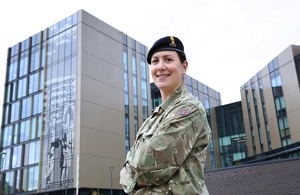A Force for good business
Reservist Helen Haigh, aged 37, of Bradford, has worked for WYG as a project manager for two years.

Reservist Helen Haigh, aged 37, of Bradford, has worked for WYG as a project manager for two years. She combines her civilian role with serving as a captain with the Royal Engineers.
Whether it’s a student campus in the centre of Leeds or a military installation in the Middle East, consulting and engineering firm WYG, depends on its teams of experts to develop, design and deliver major projects worldwide. Attracting and retaining skilled staff is a key priority for the Gold Employer Recognition Scheme (ERS) Award holders.
Director, Anrew Fotherby said:
We don’t keep count, but we recruit a higher than usual proportion of our people from the military. For us, it’s not only about technical knowledge. It’s about broader-based skills – leadership, discipline, the ability to problem-solve and to generate great working relationships both internally and with our clients, and create high performing teams.
WYG has its UK headquarters in Leeds, and has recently become part of the global consulting and engineering firm, Tetra Tech, that has 20,000 people in more than 450 locations around the world.
As well as being one of the companies behind Leeds City College’s new city-centre campus and the re-development of the world-famous Headingley Stadium, its recent portfolio includes a new base for the Royal Navy in Bahrain and UK Government aid programmes across sub-Saharan Africa.
It is also the only commercial company in the whole of West Yorkshire to win a Gold Award in the MOD’s Defence Employer Recognition Scheme.
The award recognises the firm’s strong, forces-friendly credentials which cover not only its recruitment and selection processes but also the HR policies it has in place to support reservists, employees who also serve in the military.
WYG president, Douglas McCormick said:
Securing the award was a major validation of the support we provide to the Armed Forces, including our reservists.
We recognise the value that service leavers and reservists bring to the company and are committed to supporting them. More importantly, the ERS Gold Award doesn’t mark the end of that commitment, but the beginning.
To be a Gold Award winner, organisations must sign the Armed Forces Covenant in which they pledge to treat the military fairly. As well as supporting reservists when they are deployed on active service, they must also give them at least 10 days’ fully-paid additional leave to enable them to do annual training.
At WYG, support for the military also includes fund-raising for veterans’ and other military charities and a mentoring programme to help service leavers get a foothold in the construction industry.
Phil Walton, head of engagement at the Reserve Forces’ and Cadets’ Association for Yorkshire and the Humber, which operates the Defence Employer Recognition Scheme in North and West Yorkshire
Gold Award winners set the standard that the best employers aspire to. Many employers start off by simply signing up to the Armed Forces Covenant which they can do quickly and easily online. From there, they have the option to develop the degree of commitment they show the military, progressing to Bronze and, then, Silver Award level, before aiming for Gold.
Employers sign up to ‘do their bit’ for the military. But they also recognise the benefits to making themselves more attractive to a loyal and motivated pool of potential recruits that will help their organisations grow and thrive.
Reservist Helen Haigh
Reservist Helen Haigh, aged 37, of Bradford, has worked for WYG as a project manager for 2 years. She combines her civilian role with serving as a captain with the Royal Engineers. Having a supportive employer has allowed Helen to pursue her civilian career while maintaining links to the Armed Forces as a Reservist.
Why did you join the reserves?
After university, I spent 10 years in the regular Army serving in various roles, including in Afghanistan. When I left to get a civilian job, it seemed natural to be part of the reserves.
How much time do you spend as a reservist?
The amount of time you devote to the reserves is up to you. Training is flexible and you can fit it round your life. I tend to do my training in weekend blocks.
What is your role with the reserves?
Currently, I spend quite a bit of time in the Yorkshire area supporting the 4th Infantry Brigade in community engagement.
What support do you get from your employer?
WYG has comprehensive policies in place and we get a standard 10 days paid leave a year for training as well as the possibility of sabbaticals if we choose to go on deployment.
How does being a reserve impact on your job?
Being in the Reserve gives you the opportunity to build a much wider skills base. I encourage colleagues to think about it because of the opportunities it provides. Also it’s a great way of making new friends.
Five top reasons for signing up to the Armed Forces Covenant